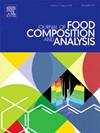Development of an analytical fluorescence method for quantifying β-glucan content from mushroom extracts; utilizing curcumin as a green chemical fluorophore
IF 4
2区 农林科学
Q2 CHEMISTRY, APPLIED
引用次数: 0
Abstract
In this study, a β-glucan quantification method from mushrooms based on the fluorescence enhancement of interaction with curcumin was developed. Fourier transform infrared spectroscopy-attenuated total reflectance (FTIR-ATR) was used to confirm the interaction. Key factors, including pH, temperature, effect of salt, wavelength, and fluorophore ratio were optimized. The method was validated with curcumin concentrations of 4 ppm and 10 ppm to label β-glucan for the determination of extracted β-glucan ranges of 1–20 ppm and 20–60 ppm showing good accuracy (93.0–107.0 %) and precision (RSD < 2.0 %). The method performed linear response R2 values of 0.9989 and 0.9968, the limit of detection (LOD) of 0.28 and 0.92 ppm, and limit of quantification (LOQ) of 1.52 and 5.06 ppm for 4 and 10 ppm curcumin concentration, respectively. At last, the results of the analysis of β-glucan in commercial Lentinula edodes and Lentinus squarrosulus were relatively comparable with common dye methods.
利用姜黄素作为绿色化学荧光团,开发定量蘑菇提取物中 β-葡聚糖含量的荧光分析方法
本研究开发了一种基于与姜黄素相互作用的荧光增强的蘑菇中β-葡聚糖定量方法。傅立叶变换红外光谱-衰减全反射(FTIR-ATR)用于确认相互作用。对 pH 值、温度、盐的影响、波长和荧光团比例等关键因素进行了优化。该方法在姜黄素浓度为 4 ppm 和 10 ppm 时进行了验证,以标记 1-20 ppm 和 20-60 ppm 提取液中的β-葡聚糖,结果表明该方法具有良好的准确度(93.0-107.0%)和精密度(RSD < 2.0%)。该方法的线性响应R2值分别为0.9989和0.9968,姜黄素浓度为4ppm和10ppm时的检出限(LOD)分别为0.28和0.92ppm,定量限(LOQ)分别为1.52和5.06ppm。最后,商品牛肝菌和扁豆中β-葡聚糖的分析结果与普通染料法比较具有可比性。
本文章由计算机程序翻译,如有差异,请以英文原文为准。
求助全文
约1分钟内获得全文
求助全文
来源期刊

Journal of Food Composition and Analysis
工程技术-食品科技
CiteScore
6.20
自引率
11.60%
发文量
601
审稿时长
53 days
期刊介绍:
The Journal of Food Composition and Analysis publishes manuscripts on scientific aspects of data on the chemical composition of human foods, with particular emphasis on actual data on composition of foods; analytical methods; studies on the manipulation, storage, distribution and use of food composition data; and studies on the statistics, use and distribution of such data and data systems. The Journal''s basis is nutrient composition, with increasing emphasis on bioactive non-nutrient and anti-nutrient components. Papers must provide sufficient description of the food samples, analytical methods, quality control procedures and statistical treatments of the data to permit the end users of the food composition data to evaluate the appropriateness of such data in their projects.
The Journal does not publish papers on: microbiological compounds; sensory quality; aromatics/volatiles in food and wine; essential oils; organoleptic characteristics of food; physical properties; or clinical papers and pharmacology-related papers.
 求助内容:
求助内容: 应助结果提醒方式:
应助结果提醒方式:


